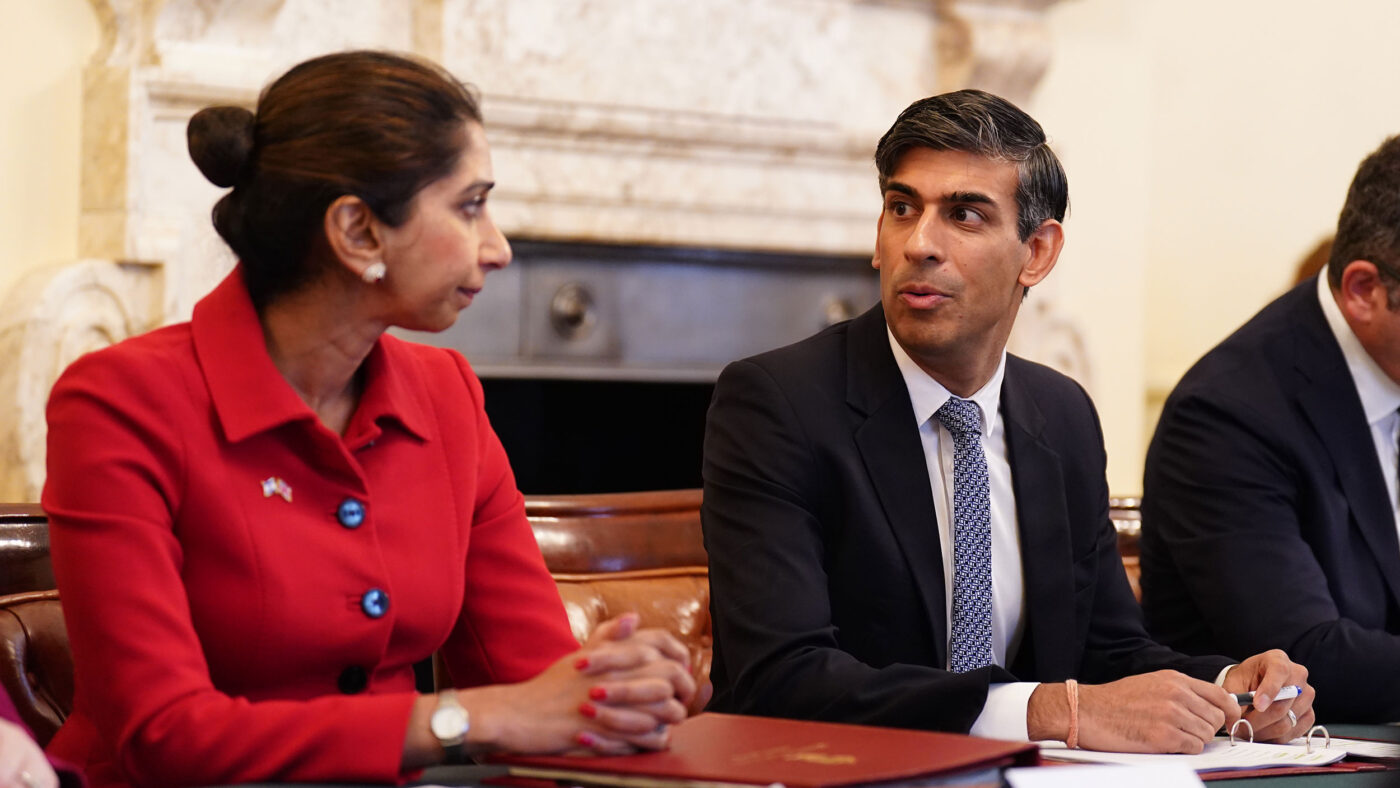It’s an old saw in political commentary that united parties win elections and divided parties lose them. It has earned this status by being true, generally speaking – although there’s a chicken-and-egg question about whether victory flows from unity, or unity from the prospect of victory.
After all, one plausible explanation for the thinness of the King’s Speech, and the overall timidity of Rishi Sunak’s policy offer, is that he doesn’t want to risk further splits in a party already riven with divisions after 13 years in office and multiple changes of direction and leader.
But with the Conservatives 20 points behind in the polls, it may be precisely that caution which prevents him pursuing the sort of imaginative, eye-catching policy initiatives which are surely his best hope of changing what is at present his party’s dire political trajectory.
Perhaps nothing better embodies that dilemma than Suella Braverman. For the second time in a week, the Home Secretary has been freelancing, dominating the front pages with controversial comments which her colleagues refuse to support.
It is an open question how much of the Conservative Party, or its electorate, she’s really speaking for. The Home Secretary has many critics, but this is a country where one-third of those polled told YouGov in 2011 they backed the use of live ammunition against rioters; the British id is not a liberal one, whatever the Whigs might have you believe.
Nor is the problem entirely a question of personnel. As I noted in my paper for the Adam Smith Institute on breaking up the Home Office, it is a deeply dysfunctional department that could have been designed to foster paranoia in the small team of politicians unfortunate enough to lead it.
It is also an unfortunate fact that it has been the habit of recent prime ministers to use the post of home secretary to buy off the right of the party – perhaps explicitly in this case, where there are suspicions Sunak and Braverman did a deal.
However, the various missions they are supposed to undertake, most obviously bringing immigration down, would require cross-governmental buy-in and implementation that just isn’t there, leaving the home secretary with little to do but sound off.
Whatever happens to Braverman, the Prime Minister would be confronted by the same dilemma. Does he give the position to a loyalist, one more on board with his government’s actual priorities? Or install another, hopefully more pliable, right-winger in the hope of a quiet life?
Yet unlike in normal circumstances – indeed, the circumstances that prevailed until the horrifying events of October 7 – the Opposition isn’t united either.
The great show of disciplined confidence Sir Keir Starmer and his party put on in Liverpool has quickly given way to bitter infighting over events in the Middle East. A member of the shadow cabinet has resigned, and more pay follow; so too have many councillors.
As a result, we may now have an interesting test of the heuristic about the importance of unity to victorious parties. Because whilst Labour is very visibly divided, it is not divided over an issue that the great majority of British voters (as opposed to a very noisy minority) are greatly exercised about.
The question is therefore whether the broader impression that Starmer isn’t in control filters through to voters beyond the substance of the dispute. (And of course, it helps that the electorate doesn’t exactly have a united alternative in the Conservatives.)
From here, the chances of Labour throwing away their polling lead sufficiently to imperil their chances of forming the next government seems remote. But current events could have a much bigger impact, perhaps not yet appreciated, after 2024.
Should they win, Starmer and his team are going to inherit a truly miserable in-tray, with mounting pressure on the public purse, taxes already at historic highs, and precious little scope for new spending.
In those circumstances, it will likely prove increasingly difficult for the Prime Minister (if such he becomes) to keep his restive backbenchers in line. That problem very likely becomes more acute, much faster, if he loses that initial honeymoon period, and his MPs haven’t learned the habit of discipline in opposition.
As I said, none of this seems likely to be enough to rob Labour of the momentum needed to cross the finish line next year. But 12 months is a long time in politics, and there is plenty of scope for events (not least in the Levant) to overtake this picture again.
A year out from what looks to be a decisive election, both parties are remarkably fragile. What happens when a stoppable force meets a moveable object?
Click here to subscribe to our daily briefing – the best pieces from CapX and across the web.
CapX depends on the generosity of its readers. If you value what we do, please consider making a donation.


